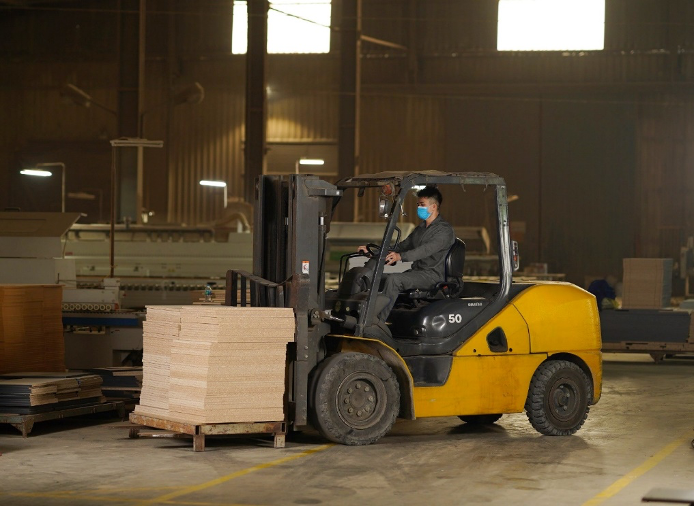Impact on consumers and domestic enterprises
For many years, some streets selling wooden furniture in Hanoi such as De La Thanh, Nguyen Trai, Cau Dien, or in Ho Chi Minh City such as Truong Chinh, Ngo Gia Tu, Bach Dang... mostly sell imported goods from China, Taiwan, Malaysia. However, according to a survey, most of them are Chinese goods with a variety of designs and models from TV shelves, dining tables, family tables and chairs, desks, sofas, office chairs...
Employees at these furniture stores said that many Vietnamese businesses have high-quality products, but the designs are often not as diverse and eye-catching as imported products, while the prices are even more expensive.
On the contrary, Chinese imported products are cheaper and have more diverse designs, so they are often favored by consumers. According to shop owners, cheap Chinese imported tables and chairs often deteriorate within the first 1-2 years of use, forcing consumers to frequently maintain and repair them. Therefore, customers need to consider carefully before buying furniture.
Not only that, cheap imported tables and chairs from China have broken the price level of the domestic popular furniture market for many years because of their extremely low prices. Vietnamese enterprises producing this group of products find it difficult to compete in their “home market” even though they have higher quality.
Talking to reporters, Mr. Nguyen Van Huy - representative of domestic furniture distribution agent - “The widespread import of cheap products with poor quality has affected the furniture manufacturing industry, which is facing many difficulties due to the general economic situation,” said Mr.
Mr. Le Van Tien - representative of a genuine furniture distributor - said: "Previously, my family had 3 stores specializing in selling and distributing genuine Vietnamese furniture products such as Hoa Phat , Xuan Hoa... but in the past 2 years, we had to reduce the scale to only 1 store".
Explaining this sad reality, Mr. Tien said that partly because the market is more gloomy after the pandemic, partly because the stores selling cheap imported furniture are rampant, labeled as Vietnamese goods, making it impossible for customers to distinguish.
Is it easy to regain the advantage on the "home field"?
Grasping the situation and quickly coming up with solutions, the Ministry of Industry and Trade issued Decision No. 235/QD-BCT on the application of anti-dumping measures on a number of tables and chairs from the People's Republic of China (China) in February this year. However, after 6 months of implementation, the market for tables and chairs imported from China is still bustling, with thousands of products being sold in stores and on the internet with prices remaining almost unchanged.
Regarding this, some small traders selling wooden furniture on De La Thanh Street said that the tax will help domestically produced goods become more competitive. However, importers of cheap products from China will also have a way to "circumvent the law" through informal channels that are not too difficult, and traders from both countries have long traded many products.

Competition from cheap imported products from China is increasing, which puts pressure on increasing costs, but is also a driving force for domestic enterprises to continuously improve and innovate production methods, in order to increase labor productivity, use resources effectively to reduce product costs. Thereby improving competitiveness with imported goods, meeting consumer tastes in terms of design and quality.
Hopefully in the coming time, with the contribution of agencies and sectors, the decision will be increasingly implemented strongly, reducing difficulties for domestic enterprises, while supporting enterprises to feel secure in production, helping consumers to use high-quality products at reasonable prices.
Source


![[Photo] More than 17,000 candidates participate in the 2025 SPT Competency Assessment Test of Hanoi National University of Education](https://vphoto.vietnam.vn/thumb/1200x675/vietnam/resource/IMAGE/2025/5/17/e538d9a1636c407cbb211b314e6303fd)
![[Photo] General Secretary To Lam visits exhibition of achievements in private economic development](https://vphoto.vietnam.vn/thumb/1200x675/vietnam/resource/IMAGE/2025/5/18/1809dc545f214a86911fe2d2d0fde2e8)

![[Photo] National conference to disseminate and implement Resolution No. 66-NQ/TW and Resolution No. 68-NQ/TW of the Politburo](https://vphoto.vietnam.vn/thumb/1200x675/vietnam/resource/IMAGE/2025/5/18/adf666b9303a4213998b395b05234b6a)






















![[Photo] Prime Minister Pham Minh Chinh chairs meeting on science and technology development](https://vphoto.vietnam.vn/thumb/1200x675/vietnam/resource/IMAGE/2025/5/17/ae80dd74c384439789b12013c738a045)
































































Comment (0)